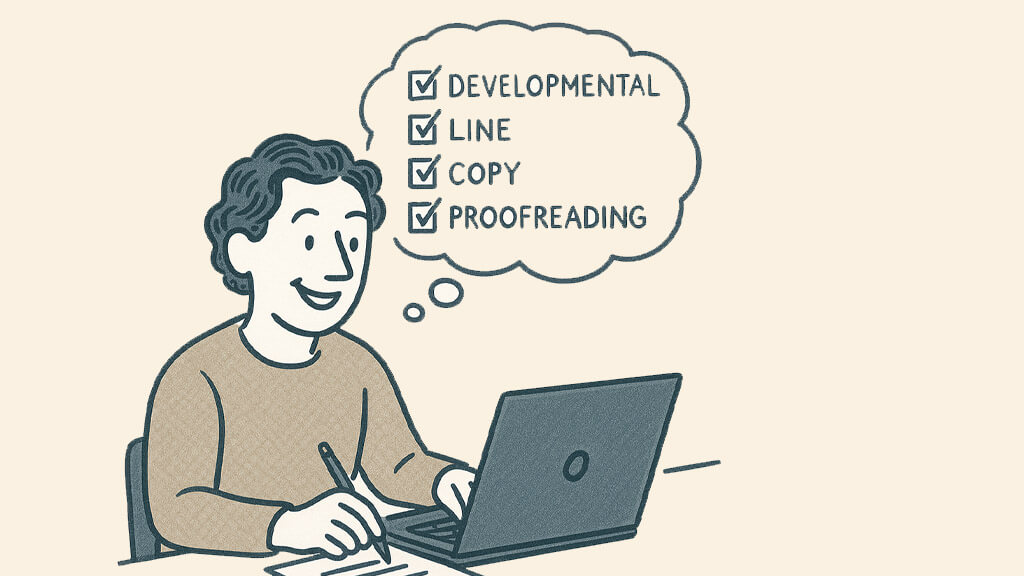Want Readers to Rave About Your Book?
A polished manuscript separates great books from average ones. At Izzard Ink, we’ve discovered meticulous editing is the key ingredient behind successful, acclaimed publications. Whether you’re writing fiction or nonfiction, this comprehensive editing checklist guides you from raw draft to refined manuscript.
Editing Stages
| Editing Stage | Primary Goal | Key Activities |
| Developmental | Structure & Impact | Story arc, logical flow, plot coherence |
| Line Editing | Style & Clarity | Sentence structure, dialogue, voice |
| Copy Editing | Precision & Consistency | Grammar, spelling, factual accuracy |
| Proofreading | Final Polish & Quality Check | Typos, formatting, reader experience |
Stage 1: Developmental Editing – Craft Your Foundation
Developmental editing addresses your manuscript’s foundational elements. Without a strong structure, your story or message can’t resonate deeply.
Editing Checklist for Developmental Editing:
Fiction: Clear narrative arc (beginning, middle, end), believable characters, no plot holes.
Nonfiction: Logical chapter sequence, clear argument flow, impactful content relevance.
Real-World Example: The Great Gatsby reached legendary status due to editor Maxwell Perkins’ developmental critiques—refining Gatsby’s mysterious character.
Simon Sinek’s Start With Why used clear editing to boost Sinek’s professional influence significantly.
Pro Tip: Begin your editing journey with Izzard Ink’s Manuscript Assessment and Action Plan, identifying exactly what your manuscript needs to reach elite publication standards.
Editor Insight: Developmental editing means being willing to restructure and re-envision your manuscript for maximum impact while preserving your authentic voice and professional credibility.
Stage 2: Line Editing – Refine Your Writing Style
Line editing ensures each sentence sings clearly and powerfully.
Editing Checklist for Line Editing:
Tighten language, eliminate redundancy.
Ensure dialogue authenticity.
Maintain a consistent and engaging voice.
Pro Tip: Read your manuscript aloud. This quickly reveals awkward phrasing and rhythm issues.
Editor Insight: Elite editors meticulously balance clarity, conciseness, and stylistic flair, ensuring your unique voice is preserved and enhanced.
Stage 3: Copy Editing – Ensure Accuracy and Consistency
Copy editing polishes your manuscript to professional standards of correctness.
Editing Checklist for Copy Editing:
Eliminate grammatical errors and typos.
Ensure factual accuracy and consistency.
Use a style sheet to track decisions (capitalization, spelling, terminology).
Real-World Example: Stephen Hawking’s editors on A Brief History of Time meticulously simplified complex topics, ensuring accuracy without sacrificing depth or authority.
Pro Tip: Automated grammar-checking software helps but never replaces a skilled human copy editor.
Stage 4: Proofreading – Final Quality Assurance
Proofreading is your final checkpoint to catch small errors and formatting issues.
Editing Checklist for Proofreading:
Carefully review formatted pages for overlooked errors.
Verify design consistency (fonts, headers, page breaks).
Ensure readability and overall user experience.
Common Pitfalls:
Missing words or double words (“the the”).
Inconsistent headings or formatting anomalies.
Quick Win: Have a fresh set of eyes do a final read-through—it’s remarkable what they’ll spot!
Beginner Tip: New authors often miss homophone mistakes (there/their/they’re); double-check carefully for these.
Mindset Shifts: Embrace Constructive Criticism
Elite authors and editors view editing as an opportunity, not a criticism. Approach feedback constructively to transform your manuscript and enhance your professional or personal legacy.
Ready to Elevate Your Manuscript?
Editing can make or break your book’s success. At Izzard Ink, our elite editors transform promising manuscripts into top-tier books, empowering you without compromising authenticity or voice. We proudly support a wide range of projects, including memoirs and niche expertise publications.
Join the ranks of our successful authors—over 80% rank in the top 15% of literary reviews.
Contact us today to learn more about our elite editing services and our Manuscript Assessment and Action Plan.
Frequently Asked Questions (FAQs)
What is developmental editing?
Developmental editing focuses on your book’s overall structure, content flow, and clarity.
How do I know my manuscript needs line editing?
If your sentences feel clunky or unclear, a line edit is essential.
Can I just use editing software?
Editing software is helpful, but human editors catch nuances software cannot.
How long does professional editing take?
It varies depending on manuscript length and editing stage, typically several weeks per editing phase.




